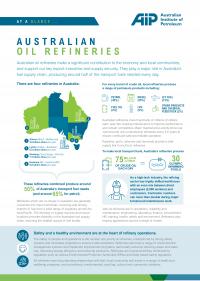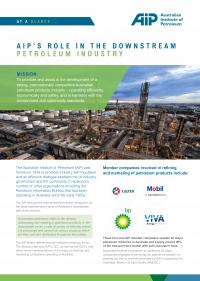Resources
Featured
Date
Description
A full list of 'At a Glance' industry factsheets. , At a Glance: The Changing Trend in Automotive LPG Use in Australia Shifting consumer preferences, as well as economic and policy changes, have seen the demand for LPG powered vehicles and LPG fuel decline sharply in recent years. Proceed to factsheet , At a Glance: Current Fuel Prices Understanding the relationship between market prices is important to understanding the fuels market in Australia. Proceed to factsheet , At a Glance: AIP's Role in the Downstream Petroleum Industry The Australian Institute of Petroleum (AIP) was formed in 1976 to promote industry self-regulation and an effective dialogue between the oil industry, government and the community. It replaced a number of other organisations including…, At a Glance: How are Petrol Prices Determined in Australia? Fuel prices around the world are largely determined by regional markets and the benchmark prices and government taxes applying in those markets. Proceed to factsheet , At a Glance: Australian Refineries Support Better Fuels Australian refineries have long supported orderly transitions to better fuel standards where a community benefit has been demonstrated in terms of health and environmental outcomes, and where the cost impacts on refineries and consumers can…, At a Glance: Australian Oil Refineries Australian oil refineries make a significant contribution to the economy and local communities, and support our key export industries and supply security. They play a major role in Australia’s fuel supply chain, producing around half of the transport fuels…Date
Description
Fuel prices around the world are largely determined by regional markets and the benchmark prices and government taxes applying in those markets.
Date
Description
Australian oil refineries make a significant contribution to the economy and local communities, and support our key export industries and supply security. They play a major role in Australia’s fuel supply chain, producing around half of the transport fuels needed every day.
Date
Description
The Australian Institute of Petroleum (AIP) was formed in 1976 to promote industry self-regulation and an effective dialogue between the oil industry, government and the community. It replaced a number of other organisations including the Petroleum Information Bureau that had been operating in…Date
Description
Subsidising domestic alternative fuel production is not necessary for energy security The reliable supply of conventional transport fuels (petrol, diesel and jet fuel) to the Australian market is underpinned by a diversity of supply options for petroleum products from domestic refiners and…Date
Description
AIP has produced a set of basic facts on biofuels in Australia to inform consumers, commentators and other interested parties. AIP has consistently stated that there is a sustainable role for biofuels in the Australian fuels market provided biofuels are competitively priced, have a reliable supply…Date
Description
AIP member companies, individually, and collectively through the Institute, share the general community concern for conservation of the environment and actively seek to protect air, water and soil from contamination through their operations and through communication with Governments and local…